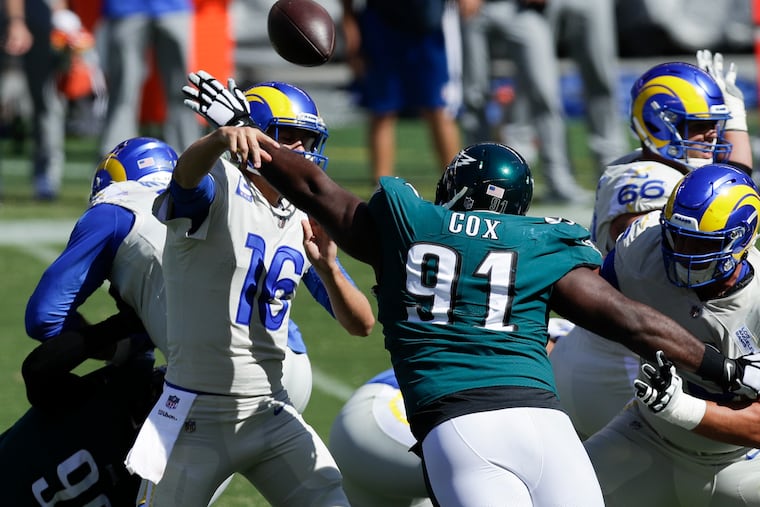Eagles linemen Fletcher Cox, Brandon Graham, Malik Jackson need to show up | Marcus Hayes
Will the $200 million trench men start earning their money?

The numbers never lie.
The Eagles have $212 million committed to their top four defensive linemen: Fletcher Cox, Brandon Graham, Malik Jackson, and Javon Hargrave.
Those four defensive linemen combined for one sack in the first two games. The Eagles are 0-2.
The entire Eagles defensive scheme is predicated on defensive-line dominance. Defensive coordinator Jim Schwartz lines his ends up wide and tells his tackles to keep the ends clean. He hates to blitz. So if the line doesn’t get home, the defense fails.
The defense is failing. It has allowed 64 points in 62 minutes on the field.
Yes, it has been asked to defend short fields. Yes, the Eagles' offense has given the ball away six times in the past seven quarters. Yes, regressing quarterback Carson Wentz is the Eagles' biggest problem. But good defenses compensate for bad quarterbacks and offensive mistakes.
This is not a good defense. Worse, this might not even be a good defensive line. The players seem to realize that.
“We hold ourselves accountable,” Graham said after Sunday’s 37-19 demolition at the hands of the visiting Rams. “We are the engine of this defense. We have to make sure we step it up some.”
More than some. Because this is not entirely new.
Cox plays defensive tackle, a position where sacks are less indicative of strong play than end, but he hasn’t had a sack in seven games, dating back to the last four games of 2019 and the playoff loss to visiting Seattle. Cox will take home more than $12 million in 2020.
Graham plays end. He has two sacks in his last eight games. That projects to four sacks over a 16-game season. He will earn slightly more than $11 million this season.
It’s more difficult to fault Jackson, a swing tackle/end whose foot injury cost him 2019, when he took home the first of the two $10 million paychecks he’ll earn in his three-year, $30 million deal.
Similarly, Hargrave, a free-agent prize, played his first game Sunday, against the Rams, having missed the first with a pectoral strain. But if you play to your pay -- Hargrave is a $13 million man this season -- you’d think he’d have managed at least one tackle in his 25 snaps. He did not.
We’ll omit, for the moment, 2017 first-round end Derek Barnett, since he appears to have lost his starting spot to 2018 fourth-round pick Josh Sweat. Sweat, for the record, has a sack. He is also making $750,000 this season. So far, he’s the only one playing above his pay grade.
Why all the focus on draft slots and salary? Because this is a professional sport with a hard salary cap. Money and picks are spent on an expected rate of performance.
This isn’t high school. This isn’t about grading on curves. This is the NFL. The season is one-eighth over. The team is in last place. Considering the injury issues on the paid and pedigreed offensive line, the defensive line should be the best unit. It is not.
Cox is a five-time Pro Bowl player. Defenses scheme to neutralize him. The best teams do just that: Cox has one sack in seven career playoff games.
Part of the neutralization strategy lies in quarterbacks getting rid of the ball quickly. Part of the neutralization strategy lies in misdirection plays and using moving pockets, the hallmark of Rams coach Sean McVay and a strength of Washington quarterback Dwayne Haskins.
Still, a dominant defensive line wouldn’t allow Haskins and Rams quarterback Jared Goff to compile a 110.2 passer rating over the last two games. Haskins’ rating in 2019 was 76.1. Goff’s rating in 2019 was 86.5.
“You’re right, man, we can be more dominant," Graham admitted.
To be fair, the Eagles' front office essentially ignored the team’s shortcomings at linebacker. Tight ends have accounted for all four receiving touchdowns in the two games.
And while the Birds added lockdown cornerback Darius Slay, the secondary sorely misses safety Malcolm Jenkins. He essentially acted as an extra linebacker: he supported the run superbly, covered backs and tight ends, and was a functional blitzer. His replacement, converted cornerback Jalen Mills, is none of those things; at least, not yet.
But the additions of Hargrave and Slay were geared to offset the loss of Jenkins. Slay has done his part. Hargrave has not -- which, again, is at least a little bit understandable in these early days.
The lack of production from Cox, Graham, and Jackson is neither understandable nor forgivable.